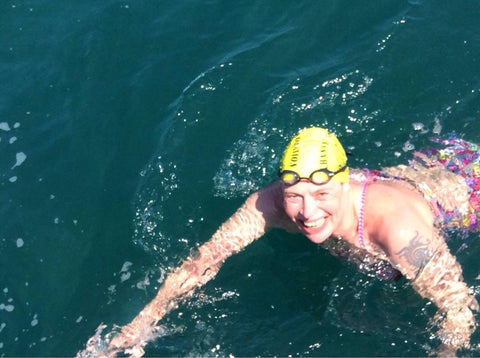
Mental Health and Sport
August 30, 2019 7 min read
This article was written by our special guest writer, Cate Read.
For as long as I can remember I have suffered with depression. I haven’t always known it, but now it seems so obvious. When I was younger, it just seemed like I didn’t feel great for other reasons and let’s face it, there always are plenty of reasons as a teenager, but as the occasions build up and start to form patterns, then you sort of start to know. The thing is, by the time you know that you are in the depths of a depression, you’ve probably been suffering for some time. For me there are clear signs: becoming more sensitive and quick to react, starting to give up on things and getting easily frustrated, sinking into bed mid afternoon just to shut out the world, losing the motivation to cook properly, eating more junky food and, of course, my activity levels plummet. It becomes a vicious circle, all the things that help you to feel good start to drop off and then you feel worse because you are not doing any of the things you enjoy.

I’m sure everyone experiences depression in different ways, and for me It’s hard to describe that feeling of utter pointlessness that I experience when I am at rock bottom. It manifests itself in lots of different ways, sometimes I become angry and lash out at the closest people to me, almost in an attempt to push them away from me. Sometimes I just want to hide away, hope that everything will just go away, almost a denial. Yes, sometimes I seriously feel like there is no reason to keep being around. It is totally irrational and can happen even when I have lots good things going on in my life.
When I first recognised I was depressed I was fairly reluctant to get any help, I used to keep it at bay with St John’s Wort, or at least that is what I told myself. I guess it must have helped at one point because I kept taking it, but then it didn’t. I remember first going to the doctors and breaking down in front of them. And strangely, by the time you get to the stage of asking for help, you are almost already on the up as you’ve made the decision to try and drag yourself out of it. And even in front of a doctor, the very act of making an appointment has somehow been a positive move, which has in some way made you feel temporarily a bit more buoyant, and suddenly you feel like a fraud.
It was never an easy thing to talk about, I guess people just didn’t understand it and 25 years ago it wasn’t as widely acknowledged and accepted as it has become now. It’s was the thing you didn’t talk about, people used to raise their eyebrows at work if someone was off with ‘stress’, ‘anxiety’ or…shhh, the ‘d’ word. These days it has become much easier to say to people ‘I suffer’ and it is reassuring to know that you are not alone, no more guilty secrets and thinking that you have some kind of ugly weakness. That first time my doctor offered me antidepressants I felt almost embarrassed at taking them and I would never have admitted it to anyone other than the closest of confidantes.
My biggest turning point was sport. It started as a hobby, it became an addiction and I think now it is my lifeline. I returned to competitive swimming totally by accident just before my 40th birthday. Having spent years in my childhood ploughing a furrow in our local lido I had actively avoided swimming pools for about 25 years, but through chance I ended up in a lane with a local Master’s squad whilst my son had swimming lessons and that was me hooked. A few weeks in and I was back at my old swimming club with a massively inspiringly coach, and four months later competing in Master’s events.
For anyone who doesn’t exercise regularly, it may be hard to imagine the ‘buzz’ that you get from a tough training session. There’s no doubt, the hardest thing about doing exercise is putting your kit on, and this is magnified when you suffer from depression. The negative influences in your head make it very easy to say ‘I can’t be bothered’ or ‘I’ll do it tomorrow’, even though you know that it will make you feel great. You just can’t quite put yourself in that place before you do it.
Its funny because when I’m feeling low I go through the some process every time I train. For example, I arrive for swim training thinking I’m not really up for this, but I’ve made the effort so I’m going to do it. I get in the water and my first few lengths always feel a little sluggish; I should know the science of it, I just need to warm up. Warm up over and I’m into the main session and I’m being asked to do 20 x 100m of a specific time, and my initial thoughts are always negative ‘what? 20? I’ll never make those times’. But once I’m off the negativity just drains away and is replaced with what can only be described as a kind of euphoria. I’m in the moment and I’m just giving it everything and of course I’m going to make those times, in fact I’m going to do better each time and why are we only doing 20? It is almost like I’ve taken some kind of mind altering drug. After an hour in the pool I feel great, I’m hungry and I’ve earned a big meal, and I can’t wait for the next session. Next session, same process and gradually I find myself lifting out of my depression.
I’ve been on my exercise buzz for 10 years now. One thing led to another, and I became quite addicted to setting myself greater and greater challenges. I moved from the pool to open water and then why not have a go at a wee triathlon, and before I knew it I was doing my first Ironman, cycling from Sheffield and across France to compete in the Paris marathon and swimming over the English Channel in a relay. My more active lifestyle, albeit a little impulsive at times, has had a dramatic affect on my mood changes. I rarely have to rely on medication, but I know it is always there as a back up. I don’t go to see my doctor as often as before, although it is always worth keeping the avenues open and have regular reviews appointments in case the back up is needed. I don’t always train as hard as when I first went back to swimming, but as long as I am ticking over with some type of exercise every day I tend to be fine.
One of the best forms of exercise to beat my mood has been cold water swimming. As for most people, the winter months are usually the worst for me, and they also coincide with a few poignant trigger points which bring about sad memories. A couple of years ago, as we were living close to the sea, my partner and I challenged ourselves to swim in the sea every day in January. What an experience, we alternated days with and without a wetsuit and we swam in all conditions. We often went to the same location and every time it was different depending on the weather condition, tide level, time of day etc. We tried swimming very early in the morning, we swam in the dark and we swam on my birthday with balloons and pretty lights. It was incredible. That feeling when you hit the cold water and you just think ‘there is no way I’m going in here’ and once you are in, the almost burning sensation on your skin with the cold is so exhilarating. That feeling stays with you as you fumble into your clothes with frozen hands next to your car in the beach car park, as you shiver your way home frantically trying to warm up with the heater cranked up in the car. The sea temperature on the South coast reaches its lowest in February/March and we decided to carry on swimming well past our month and into more sensible sea temperatures, although we weren’t able to make it every day. Why did we do it? Because it felt amazing.
I have come to rely on exercise, whether it is an hour on the turbo trainer, clocking up a couple of miles at Parkrun or a dip in the local river. It has changed my life and now as I am approaching my 50th birthday I am in a very different place from where I was a decade ago. I now spend a lot of my time teaching and coaching other people in swimming, cycling and triathlon at all levels, and I hear so many people talking about the positive impact that sport has had on their lives and both mental and physical health. It’s never too late to start, and it doesn’t matter what level you choose to participate. Just allowing yourself to push slightly out of your comfort zone can have the most fantastic effects, but watch out, it can also be incredibly addictive.
More About Cate Read
Cate was a competitive swimmer as a youngster, reaching National level. Approaching the age of 40 she found herself training again, but this time for Master’s events. Cate medaled nationally in front crawl events and took to the open water during an initial foray into triathlon. Since then she never looked back!
She is a keen open water swimmer and has competed in Open Water events across the UK, and travelled worldwide to participate in Long- and Middle-Distance triathlon events, even managing to sneak into the GB Age Group team.
Cate is also an experienced swim teacher and ASA swim coach, as well as a dedicated open water coach, personal trainer and triathlon coach. After nearly 20 years teaching Science and Maths in secondary education she decided to embrace a life working with people who share her passions for the outdoors, an active lifestyle and all things wet, really with a view to achieving some balance in her life. She has recently returned after coaching on swim expeditions in Crete!
Leave a comment
Comments will be approved before showing up.

